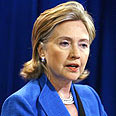

Washington remained concerned about what she called Iran's "pursuit of nuclear weapons," which could "be very destabilizing in the Middle East and beyond," Clinton told the private television network Globovision.
"We would ask the world to join us in imposing even stricter sanctions on Iran to try to change the behavior of the regime," Clinton said in the interview, which was broadcast late Tuesday.
And noting the unrest in Iran since the disputed June presidential election, she added: "We have seen in the last weeks that Iran has not respected its own democracy."
"It has taken actions against his own citizens for peacefully protesting," she said, referring to street demonstrations challenging the re-election of President Mahmoud Ahmadinejad.
The victory for the hardline incumbent, who enjoys the backing of supreme leader Ayatollah Ali Khamenei, sparked fraud allegations from two of his rival candidates, ex-prime minister Mir Hossein Mousavi and reformist Mehdi Karroubi.
"I think it is not a very smart position to ally with a regime that is being rejected by so many of their own people," Clinton said in the interview.
The administration of President Barack Obama, Clinton added, thinks "it is not in the best interest" of the world to be doing business with Iran that would "promote the regime... that is not smart."
Iran dominated talks between Obama and Russian leaders Tuesday, with White House officials noting Moscow now seemed more receptive to US arguments.
US Deputy National Security Advisor Denis McDonough said Obama was "struck by the candor with which President (Dmitry) Medvedev has underscored his concern about the growing threat from Iran."
While Tehran insists its nuclear program is strictly for energy production, the United States has long voiced fears that it could be used to manufacture an atomic bomb.
Trying to lower temperature
Iran - whose president has called for Israel to be wiped from the map -- also possesses missiles capable of reaching targets throughout the Middle East that could be fitted with nuclear warheads if Tehran possessed them.
Clinton also expressed renewed concern at the political and economic alliance between Venezuela and Iran, although she noted Washington was attempting to "lower the temperature" in the country's often tense relations.
The South American country's strongman leader Hugo Chavez, a fierce US critic, is Iran's main ally in the region. Chavez has defended Ahmadinejad numerous times in recent weeks.
"We call on the world to respect Iran because there are attempts to undermine the strength of the Iranian revolution," Chavez said last month after the election.
The United States has returned its ambassador to Caracas after almost a year without official diplomatic relations between the countries.
"We are trying to lower the temperature," Clinton said. "We want to make it clear that there are ways for us to have a conversation with people we don't agree with on many issues."















